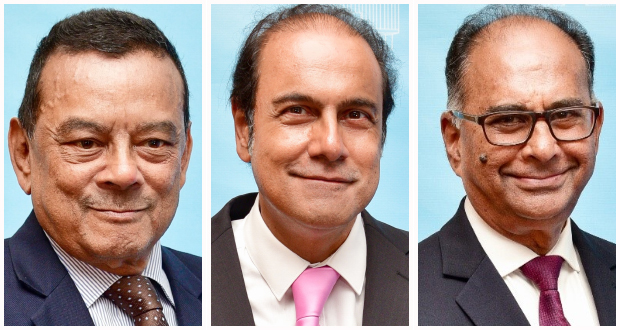Publicité
Bank of Mauritius
Toward a culture of research and adaptation
Par
Partager cet article
Bank of Mauritius
Toward a culture of research and adaptation

Le gouverneur de la Banque de Maurice.
In a recent interview published in TSE Reflect, Harvesh Seegolam, governor of the Bank of Mauritius, said the central bank has embarked on a three-year scientific partnership to accelerate and promote innovative research on emerging issues in monetary economics and financial stability. It's notable that before joining the Bank of Mauritius in 2020, Seegolam served as the chief executive of the Financial Services Commission (FSC), the regulatory body overseeing the non-bank financial services sector and global business in Mauritius. In recent years, Seegolam has been a key contributor and member of various technical committees at the Organisation for Economic Cooperation and Development (OECD) level. Notably, he was instrumental in establishing the FSC Regional Centre of Excellence – an initiative launched in collaboration with the OECD to build capacity and conduct research in financial services, competition, and digital finance in Sub-Saharan Africa for regulatory bodies and law enforcement agencies. This explains his motivation to promote a research and adaptation culture at the central bank.
Discussing the bank's strategic roadmap and key priorities, the governor said Mauritius is particularly vulnerable to global crises that continue to disrupt the global economic and financial systems. These include the dual health and economic crises triggered by the COVID-19 pandemic, the food and energy supply crises from the war in Ukraine, climate change, and the fragmentation of established global trading blocs. While the country's economic recovery is on track to reach pre-pandemic levels, it also faces significant shifts from digitalization and environmental, social, and governance (ESG) considerations, highlighting the need for strategic foresight to address current and future challenges. In this context, the Bank of Mauritius has been crucial in maintaining economic resilience and financial stability through agile and prompt decision-making.
Looking ahead, Seegolam added that the bank, along with other key banking industry stakeholders, launched a report in September 2022 on the Future of Banking in Mauritius. This report provides a roadmap for the banking sector's robust expansion across Mauritius over the medium to long term, aiming to contribute to Mauritius's strategic vision as a leading international financial center. To this end, the bank has also embarked on a transformative journey to modernize its corporate culture and operations under a five-pronged strategic plan:
• Strengthen monetary and financial stability by enhancing its monetary policy framework and updating its regulatory and supervisory tools to address evolving environmental and financial risks.
• Promote innovation and digital inclusion by modernizing its digital payments infrastructure, including issuing a Central Bank Digital Currency (CBDC), the Digital Rupee, developing a state-of-the-art cybersecurity strategy to protect investors and consumers across the bank and the broader banking sector.
• Enhance international and institutional relations by boosting cooperation and partnerships with international agencies like the Network for Greening the Financial Sector (NGFS), other central banks, and academic stakeholders.
• Develop the bank's Climate Change Centre into a regional Centre of Excellence by integrating climate-related risks into the bank's regulatory, supervisory, and monetary policy frameworks, advancing the bank's net-zero agenda, and developing a sustainable finance framework. • Advance the bank's digital transformation of its internal operations and adhere to the highest standards in talent development to position the Bank of Mauritius as a reference central bank in the region.
Publicité
Les plus récents






